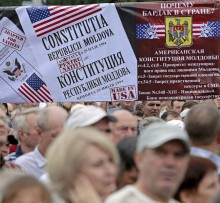Last Sunday, the Moldovan capital, Chisinau, was rocked by a major anti-government rally involving thousands of protesters, organized by the Civic Platform Demnitate si Adevar (Dignity and Truth – DA). One of the protesters’ key demands was early parliamentary elections (not later than March 2016) and free elections on equal terms. They also demanded the resignation of the incumbent president, election of the president by universal suffrage, and that those guilty of a $1 billion bank fraud be brought to justice. That same day Prime Minister Valeriu Strelet met with DA representatives and said the government was prepared for talks with the protesters.
Below Moldovan political analyst Oazu NANTOI explains what was behind the big anti-government rally in Chisinau and what can torpedo a dialog between society and regime.
“Last year’s parliamentary elections in Moldova (November 30) were expected to produce a pro-European coalition. Instead, there emerged a coalition with the communists. It became known as a minority coalition. At the same time, the Moldovan public was shocked to learn about the theft of some one billion dollars from the national banking system that would cause inflation, soaring consumer prices, plummeting living standard, and mounting protest moods. That was when DA, formed February 24, stepped in. They organized rallies of protest (April 5, May 3, June 7, September 6). The key demand was that the government be returned to society. Moldova’s international visage had by then become that of a state usurped by local oligarchs, not as one ruled by law. Obviously, these protest moods won’t abate even after the new administration, formed July 30, appeared to have set course on complying with certain DA demands. Under the circumstances, the question whether the Moldovan government, oligarch-controlled and corrupt as it is, can make concessions in regard to such demands remains open. Also, how will Moldovan society respond to this? Some of the protesters’ demands are emotional, reminding one of street democracy, but I don’t think that the government is in a position to totally ignore these protest moods. In other words, what course events will take is anyone’s guess. I can only stress that the protest rally on the central square was markedly peaceful. The police and the protesters came to terms. The aggressive manifestations near the Office of the Prosecutor General were organized by marginal politicos like the ex-communist MP, Grigory Petrenko, known for his affiliation with the Antifa [Russian Legion] Movement. Antifa activists were attaching St. George’s ribbons to the fence round the Ukrainian embassy as Putin’s Russia was invading Ukraine. Will there be a dialog between the government and DA? If so, what will be the outcome? That remains to be seen.”
In your opinion, what course events will take?
“I’m not sure. I’m sure the government is in no position to ignore these protest moods, considering that those ‘upstairs’ have shown their fear by staging all those shameful alternative pop concerts with Russian guest stars like Kirkorov to try to assuage these moods – and made themselves a laughingstock in the public eye. Apparently whoever came up with the idea was a nincompoop.”
Do you think the recent events in Moldova are proof that you have reached political maturity?
“DA isn’t a political party – rather, it remains to become one. Under the Constitution of Moldova, early parliamentary elections involve remarkably complicated procedures. That’s why I’m not sure about the course events will take. There are certain legal requirements, including the resignation of the Board of the National Bank, Prosecutor General and his staff, and Anti-Corruption Center. We have problems with our national television and its attempts to ‘retouch’ our protest moods.”
Could the Kyiv Maidan scenario with the police attacking the protesters be staged in Moldova?
“Absolutely not. There is no comparing the current Moldovan administration with that of Yanukovych.”
Perhaps a compromise between the DA and the government?
“First, I can’t see a forceful solution to the situation that has developed. Second, I don’t believe a compromise will be reached. The oligarchs know that they would have to make concessions or end up having very big problems.”
Is there nothing the government – the prime minister in the first place – can do about this?
“We’re talking major problems. Capturing a state has no bearing on the executive branch. In my country the notion of captured state is mostly identified with the name of Vladimir Plahotniuc [Moldovan oligarch, politician], also, to an extent, with that of Vlad Filat, leader of the Liberal Democratic Party. The government is in a very complicated situation, considering the talks with the IMF. Three banks involved in or with that ‘fraud of the century’ will have to be liquidated. The government will have to cut on certain budget expense items, so its current status is nothing to write home about.”
Could Russia have been involved in these actions of protest, in order to destabilize the government?
“It’s very easy to blame Russia. You can’t blame Russia for embezzlement that has become a national sport in Moldova, for our state being captured not by Putin but by our own oligarchs. It is true that Russia is interested in having Moldova as a weak state that has discredited itself in the EU eyes. It is also true that corruption is rooted in our upper echelons of power. I’d describe the current domestic situation as so many questions that have to be answered, rather than a dead end. There are no scenarios yet that can help us take a joint step forward, into a better future. We kissed goodbye to such illusions back in 1991.”








